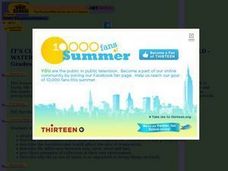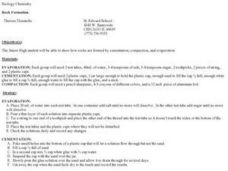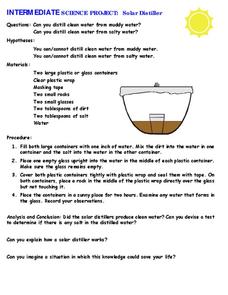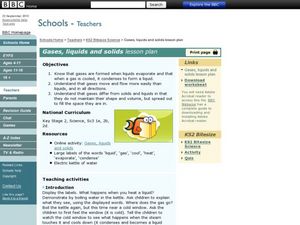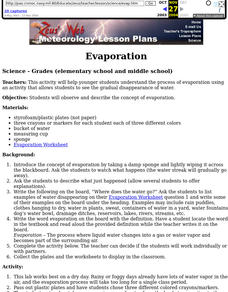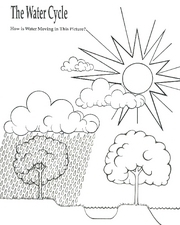Curated OER
The Water Cycle
Third graders investigate water formations by conducting an experiment. In this water properties lesson, 3rd graders utilize pie tins, sponges and salt shakers to create an evaporation and saturation experiment. Students collaborate in...
Curated OER
Condensation
Students participate in the scientific process to investigate what happens to water when it evaporates by observing condensation. In small groups they observe what happens to ice in a cup, and what occurs when they hold a bowl of ice...
Curated OER
Activity Plan 5-6: Where Does the Water Go?
Students perform an experiment to discover what happens to water as it evaporates. In this early childhood lesson plan, students observe evaporation as they conduct an experiment. Students fill cups with water, then check it daily for...
Curated OER
Water Cycle
Third graders define and discuss evaporation, precipitation, condensation, and collection, color web pages to illustrate Water Cycle book, listen to stories about Water Cycle, play trivia game to demonstrate knowledge of what they...
Curated OER
Maple Syrup Production
Learners make their own maple sugar and learn about how it is made on a grander scale. For this maple sugar lesson, students make their own maple sugar and learn about evaporation and what labor is put into making it.
Curated OER
Clouds
Students explore clouds. In this weather lesson, students identify the steps in the water cycle, define condensation and evaporation, and relate this information to cloud formation. Students perform a cloud experiment, predict weather...
Curated OER
It's Clean, Fresh and only Three Billion Years Old - Water!
Students engage in a lesson which explores the wate cycle. They get to see some very entertaining video, do fun hands-on activities and gain a better understanding of evaporation, condensation, precipitation and collection.
Curated OER
Rock Formation
Students investigate rock formation through cementation, compaction and evaporation. In this rock formation lesson plan, students simulate the process of evaporation, cementation and compaction in the lab. Students explain the formation...
Curated OER
Water And Changes Of State (3.1)
In this reviewing water and changes of state worksheet, students answer questions about water vapor, state of water, freezing point of ice, evaporation, condensation, distillation, dry ice, and the water cycle. Students answer...
Curated OER
Dimming The Sun
Students review the meanings of global warming and global dimming. While watching a video, they take notes on different aspects of the issue. In groups, they develop a list on what can be done to reduce global dimming. They...
Curated OER
Waterdrops Water Cycle
In this earth science activity, learners read an article about the water cycle. Then they continue the story about the travels of a water droplet through time and space. Students also complete sentences by writing in the correct word...
Curated OER
Temperature Change and the States of Matter
Tenth graders observe the processes of evaporation, condensation, melting, freezing, boiling, and sublimation. They do a quantitative investigation of the freezing of water, to explore explanations that involve particles.
Curated OER
Water Cycle Activity
Learners build a model and observe the cycle of evaporation and condensation that occurs in the water cycle. They see how the water cycle works, such as water condensing on the side of the jar and drops precipitating into rain that...
Curated OER
The Water Cycle
In this water cycle worksheet, learners learn about the 3 different stages of the water cycle: evaporation, condensation and precipitation. They then solve the 12 problems on the page. The answers are on the last page.
US Department of Energy
Solar Distiller
Explore the sun's ability to distill contaminated water with this simple set of classroom experiments. After filling two glass bowls, one with muddy water and the other with salt water, they are covered with plastic wrap and placed in...
Curated OER
Gases, Liquids and Solids, evaporate, shape volume,
Students conduct an online experiment to discover what happens to solids, liquids and gases in different temperatures. In this states of matter lesson plan, students get into pairs and work in a virtual laboratory to manipulate heating...
Curated OER
Watershed Landscape
Young scholars demonstrate how water flows by building a human watershed using themselves. In this ecology instructional activity, students compare and contrast point-source and non-point source pollution. They write what they have...
Curated OER
Science Videos
Students plan, practice, and act in a 2-3 minute videotaped production about a specific topic. Students from a local high school give presentations pertaining to seasons, earth rotation, and moon phases. Students analyze the...
Curated OER
Water Cycle: Social Studies Online
If you need a presentation that describes the 3 elements of the water cycle then this PowerPoint could be a good starting point. This resource is basic in its presentation and formating, and only defines the words evaporation,...
Curated OER
Evaporation
Students explain the process of evaporation using an activity that allows students to see the gradual disappearance of water.
Outside Education
Water Cycle Adventure
Evaporation, transpiration, condensation, precipitation, accumulation. Steam, clouds, rain, lakes. Guide your class members on an imaginary journey through the water cycle with a water cycle adventure script.
PhET
Concentration
When no more solute can be dissolved into a solvent, the solution has reached saturation. The interactive simulation allows learners to manipulate a solution in order to measure its concentration. The amount of solvent, the amount and...
Concord Consortium
Boiling Point
Is it getting hot in here? Observe boiling from inside a beaker in an engaging interactive. Chemistry scholars heat and cool polar and non-polar solids and observe how molecules react to temperature changes. Your class' misconceptions...
State of New Jersey
The Water Cycle - How is Water Moving in This Picture?
Here is a picture of a landscape, complete with the sun, clouds, and some rain. Use it by projecting onto your whiteboard and drawing arrows and labeling three main steps in the water cycle as you teach, or hand it out to little ones as...








